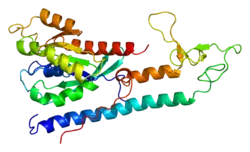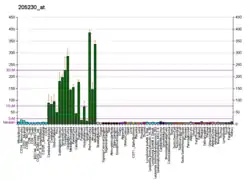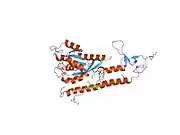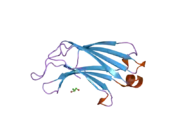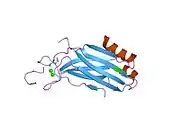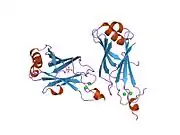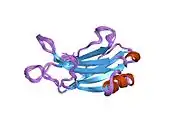RPH3A
Rabphilin-3A is a protein that in humans is encoded by the RPH3A gene.[4][5][6] It contains two C2 domains and binds calcium ions at low micromolar concentration. Rabphilin was shown to regulate neurotransmitter release in hippocampal neurons after neurons had an increased synaptic activity and their release rate was depressed.[7]
References
- GRCm38: Ensembl release 89: ENSMUSG00000029608 - Ensembl, May 2017
- "Human PubMed Reference:". National Center for Biotechnology Information, U.S. National Library of Medicine.
- "Mouse PubMed Reference:". National Center for Biotechnology Information, U.S. National Library of Medicine.
- Nagase T, Ishikawa K, Suyama M, Kikuno R, Hirosawa M, Miyajima N, Tanaka A, Kotani H, Nomura N, Ohara O (July 1999). "Prediction of the coding sequences of unidentified human genes. XIII. The complete sequences of 100 new cDNA clones from brain which code for large proteins in vitro". DNA Res. 6 (1): 63–70. doi:10.1093/dnares/6.1.63. PMID 10231032.
- Inagaki N, Mizuta M, Seino S (February 1995). "Cloning of a mouse Rabphilin-3A expressed in hormone-secreting cells". J Biochem. 116 (2): 239–42. doi:10.1093/oxfordjournals.jbchem.a124512. PMID 7822236.
- "Entrez Gene: RPH3A rabphilin 3A homolog (mouse)".
- Deák F, Shin OH, Tang J, Hanson P, Ubach J, Jahn R, Rizo J, Kavalali ET, Südhof TC (2006). "Rabphilin regulates SNARE-dependent re-priming of synaptic vesicles for fusion". EMBO J. 25 (12): 2856–66. doi:10.1038/sj.emboj.7601165. PMC 1500841. PMID 16763567.
- Fukuda, Mitsunori (April 2003). "Distinct Rab binding specificity of Rim1, Rim2, rabphilin, and Noc2. Identification of a critical determinant of Rab3A/Rab27A recognition by Rim2". J. Biol. Chem. 278 (17): 15373–80. doi:10.1074/jbc.M212341200. ISSN 0021-9258. PMID 12578829.
- Ostermeier, C; Brunger A T (February 1999). "Structural basis of Rab effector specificity: crystal structure of the small G protein Rab3A complexed with the effector domain of rabphilin-3A". Cell. 96 (3): 363–74. doi:10.1016/S0092-8674(00)80549-8. ISSN 0092-8674. PMID 10025402. S2CID 15162326.
- Weber, E; Jilling T; Kirk K L (March 1996). "Distinct functional properties of Rab3A and Rab3B in PC12 neuroendocrine cells". J. Biol. Chem. 271 (12): 6963–71. doi:10.1074/jbc.271.12.6963. ISSN 0021-9258. PMID 8636125.
- Zhang, Y; Luan Z; Liu A; Hu G (May 2001). "The scaffolding protein CASK mediates the interaction between rabphilin3a and beta-neurexins". FEBS Lett. 497 (2–3): 99–102. doi:10.1016/S0014-5793(01)02450-4. ISSN 0014-5793. PMID 11377421. S2CID 33119468.
Further reading
- Miyazaki M, Kaibuchi K, Shirataki H, et al. (1995). "Rabphilin-3A binds to a M(r) 115,000 polypeptide in a phosphatidylserine- and Ca(2+)-dependent manner". Brain Res. Mol. Brain Res. 28 (1): 29–36. doi:10.1016/0169-328X(94)00180-M. PMID 7707875.
- Imazumi K, Sasaki T, Takahashi K, Takai Y (1995). "Identification of a rabphilin-3A-interacting protein as GTP cyclohydrolase I in PC12 cells". Biochem. Biophys. Res. Commun. 205 (2): 1409–16. doi:10.1006/bbrc.1994.2822. PMID 7802677.
- Miyazaki M, Shirataki H, Kohno H, et al. (1995). "Identification as beta-adducin of a protein interacting with rabphilin-3A in the presence of Ca2+ and phosphatidylserine". Biochem. Biophys. Res. Commun. 205 (1): 460–6. doi:10.1006/bbrc.1994.2688. PMID 7999065.
- Mizoguchi A, Yano Y, Hamaguchi H, et al. (1994). "Localization of Rabphilin-3A on the synaptic vesicle". Biochem. Biophys. Res. Commun. 202 (3): 1235–43. doi:10.1006/bbrc.1994.2063. PMID 8060298.
- Weber E, Jilling T, Kirk KL (1996). "Distinct functional properties of Rab3A and Rab3B in PC12 neuroendocrine cells". J. Biol. Chem. 271 (12): 6963–71. doi:10.1074/jbc.271.12.6963. PMID 8636125.
- Perin MS (1996). "Mirror image motifs mediate the interaction of the COOH terminus of multiple synaptotagmins with the neurexins and calmodulin". Biochemistry. 35 (43): 13808–16. doi:10.1021/bi960853x. PMID 8901523.
- Gilligan DM, Lozovatsky L, Silberfein A (1997). "Organization of the human beta-adducin gene (ADD2)". Genomics. 43 (2): 141–8. doi:10.1006/geno.1997.4802. PMID 9244430.
- Ostermeier C, Brunger AT (1999). "Structural basis of Rab effector specificity: crystal structure of the small G protein Rab3A complexed with the effector domain of rabphilin-3A". Cell. 96 (3): 363–74. doi:10.1016/S0092-8674(00)80549-8. PMID 10025402. S2CID 15162326.
- Zhang Y, Luan Z, Liu A, Hu G (2001). "The scaffolding protein CASK mediates the interaction between rabphilin3a and beta-neurexins". FEBS Lett. 497 (2–3): 99–102. doi:10.1016/S0014-5793(01)02450-4. PMID 11377421. S2CID 33119468.
- Strausberg RL, Feingold EA, Grouse LH, et al. (2003). "Generation and initial analysis of more than 15,000 full-length human and mouse cDNA sequences". Proc. Natl. Acad. Sci. U.S.A. 99 (26): 16899–903. Bibcode:2002PNAS...9916899M. doi:10.1073/pnas.242603899. PMC 139241. PMID 12477932.
- Fukuda M (2003). "Distinct Rab binding specificity of Rim1, Rim2, rabphilin, and Noc2. Identification of a critical determinant of Rab3A/Rab27A recognition by Rim2". J. Biol. Chem. 278 (17): 15373–80. doi:10.1074/jbc.M212341200. PMID 12578829.
- Sun L, Bittner MA, Holz RW (2003). "Rim, a component of the presynaptic active zone and modulator of exocytosis, binds 14-3-3 through its N terminus". J. Biol. Chem. 278 (40): 38301–9. doi:10.1074/jbc.M212801200. PMID 12871946.
- Rastaldi MP, Armelloni S, Berra S, et al. (2003). "Glomerular podocytes possess the synaptic vesicle molecule Rab3A and its specific effector rabphilin-3a". Am. J. Pathol. 163 (3): 889–99. doi:10.1016/S0002-9440(10)63449-9. PMC 1868247. PMID 12937130.
- Dalfó E, Barrachina M, Rosa JL, et al. (2004). "Abnormal alpha-synuclein interactions with rab3a and rabphilin in diffuse Lewy body disease". Neurobiol. Dis. 16 (1): 92–7. doi:10.1016/j.nbd.2004.01.001. PMID 15207266. S2CID 5793677.
- Gerhard DS, Wagner L, Feingold EA, et al. (2004). "The status, quality, and expansion of the NIH full-length cDNA project: the Mammalian Gene Collection (MGC)". Genome Res. 14 (10B): 2121–7. doi:10.1101/gr.2596504. PMC 528928. PMID 15489334.
- Smith R, Klein P, Koc-Schmitz Y, et al. (2007). "Loss of SNAP-25 and rabphilin 3a in sensory-motor cortex in Huntington's disease". J. Neurochem. 103 (1): 115–23. doi:10.1111/j.1471-4159.2007.04703.x. PMID 17877635.
- Katkoori VR, Jia X, Chatla C, et al. (2007). "Clinical significance of a novel single nucleotide polymorphism in the 5' untranslated region of the Rabphillin-3A-Like gene in colorectal adenocarcinoma". Front. Biosci. 13 (13): 1050–61. doi:10.2741/2742. PMC 2667692. PMID 17981610.
This article is issued from Wikipedia. The text is licensed under Creative Commons - Attribution - Sharealike. Additional terms may apply for the media files.
